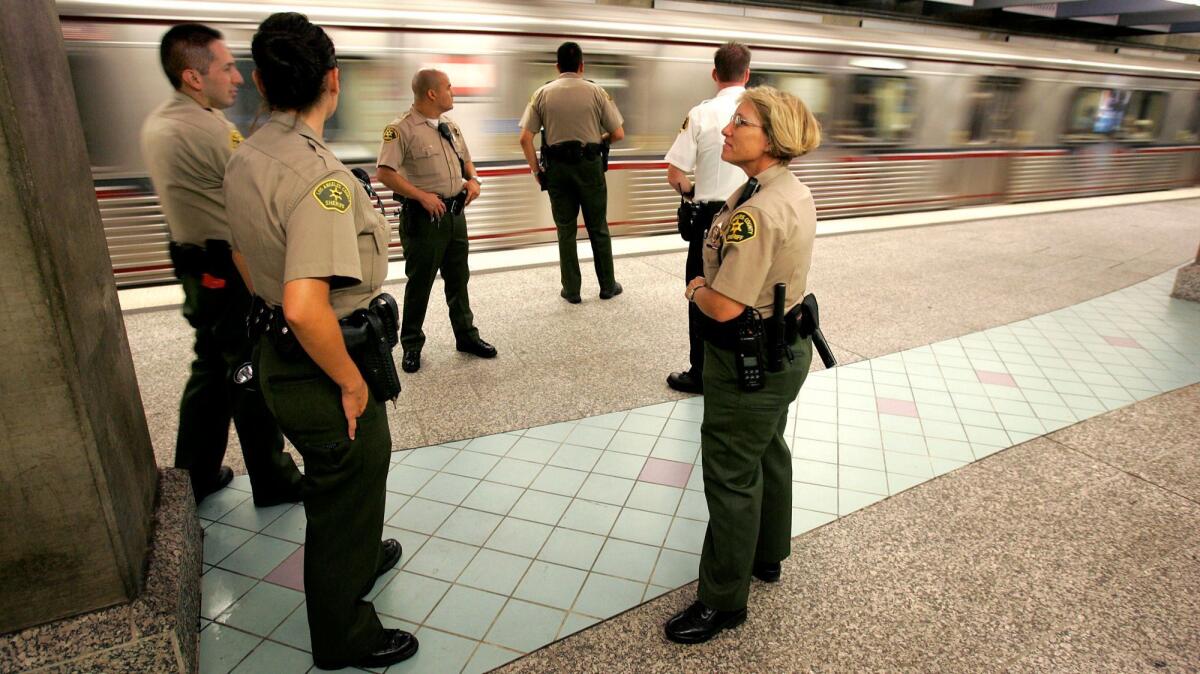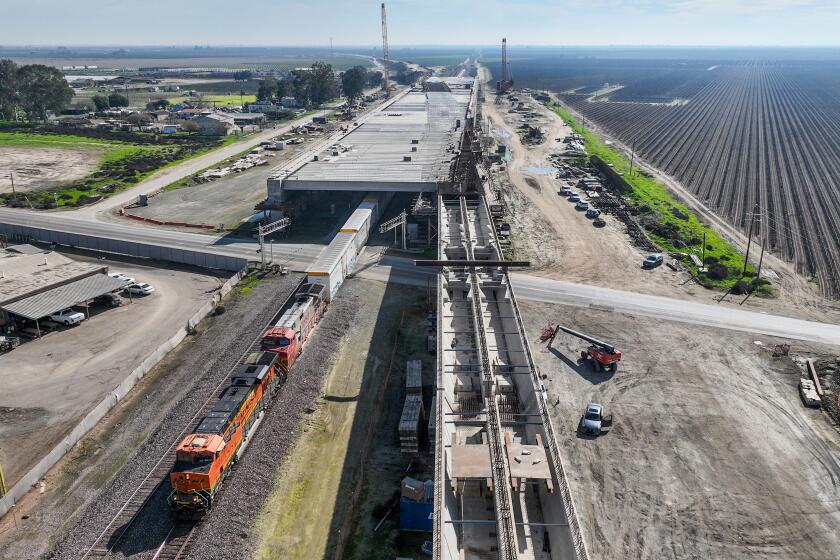Metro approves a $797-million security plan that reduces the power of the Sheriff’s Department

- Share via
For more than a decade, the Los Angeles County Sheriff’s Department has been solely responsible for patrolling Metro’s vast transit network, from subway stations in downtown L.A. to solitary bus stops near San Gabriel Valley strip malls.
That will change this summer under a $797-million security plan approved Thursday to shift law enforcement duties for more than half the public transit system to the Los Angeles and Long Beach police departments.
The unanimous decision by the Metro board marks a new chapter in a years-long debate over how best to keep riders safe and police the Metropolitan Transportation Authority’s sprawling service area.
The vote also reflects dissatisfaction with the Sheriff’s Department, which has faced criticism from transit officials and from riders who complain they rarely see uniformed deputies on trains and buses.
The perception of safety has become a major issue for Metro as officials grapple with declining ridership. Feeling unsafe, they say, is one reason people have stopped riding.
“Our goal is to ensure that all our patrons and employees can ride to work safely without fear 100% of the time,” said Metro security chief Alex Wiggins during Thursday’s meeting.
The plan calls for the LAPD to take over policing duties for L.A.’s buses, trains and transit stops, including Union Station. Long Beach police will patrol eight Blue Line stations. The Sheriff’s Department will retain control of the rest of the system.
Metro will make $645.7 million available over the next five years to contract with all three agencies, which represents a significant increase over the current annual budget of about $89 million.
The agency will spend an additional $151 million over five years for security guards to check fares and patrol some system areas, including the Rosa Parks/Willowbrook Metro station and bus hubs in El Monte and Harbor Gateway.
The costlier plan should significantly increase the number of officers patrolling the system, to about 314 for each 24-hour period, Wiggins said. The Sheriff’s Department now provides 140 to 200 deputies during the same time frame.
The proposal also will cut response times in half and increase the number of uniformed transit officers working in L.A., where nearly two-thirds of the calls for service originate, Wiggins said.
The vote sparked concern from some critics, including Sheriff Jim McDonnell, who said at a Metro committee meeting in November that hiring multiple agencies could create “seams in providing public safety.”
In a prepared statement, McDonnell said the Sheriff’s Department “did, and will continue to do, an outstanding job.” He added that the reported rate of serious crimes on Metro fell by almost 10% from 2015 to 2016.
McDonnell and others also criticized the LAPD’s proposal to fill some transit policing jobs with officers working overtime shifts, rather than creating a separate department staffed with full-time employees.
“Transit policing is a job in itself, and should not be viewed as an overtime responsibility,” McDonnell said in November. The Sheriff’s Department currently fills about 35% of its daily shifts with overtime, Wiggins said.
Los Angeles Police Chief Charlie Beck said Thursday that LAPD’s transit detail would include 70 full-time employees and about 140 overtime shifts for officers per day.
“It’s my contention that this will increase safety in Los Angeles because it puts more cops in more cars, on more buses, on more trains,” Beck said.
Beck said 30 LAPD officers will be assigned daily to ride Metro buses. The current number is closer to six, according to Metro documents.
“It’s very scary out there,” Barbara Martinez, a Metro bus operator, told board members Thursday. She said that in her 27 years behind the wheel, she has been assaulted four times.
In a recent survey, 29% of former riders told Metro that they stopped riding because they felt unsafe. Another survey found that one in 14 passengers had been groped or touched inappropriately on transit.
Other speakers pushed back, saying more police could make minority riders feel unsafe. As the board voted, activists chanted “1,000 more buses, 1,000 less police,” and unfurled a blue banner with the same slogan.
“Think about reducing fares, think about expanding service,” said Manuel Criollo, an organizer with the Labor/Community Strategy Center, the parent organization of the Bus Riders Union. “That will bring true safety and security to our riders.”
For more transportation news, follow @laura_nelson on Twitter.
More to Read
Sign up for Essential California
The most important California stories and recommendations in your inbox every morning.
You may occasionally receive promotional content from the Los Angeles Times.











